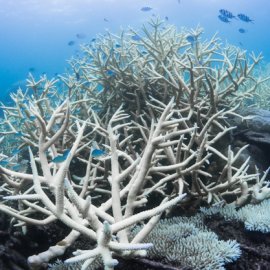Ecological Overshoot, part two
-
-
ListenPause
intro music
Welcome to World Ocean Radio...
I’m Peter Neill, Director of the World Ocean Observatory.
In the last edition of World Ocean Radio, I expressed my deep frustration with the international focus of fossil fuel emissions as the primary, even sole cause of climate change. Our inability to pursue a successful strategy there, despite resolve, is a depressing counter-force against the response required to meet the evermore evident consequences we face. With climate condition and consequence constantly in the news, public awareness must follow, but are we exploring other pathways to success beyond opposition to the vested interests of the international cartel of corporate and nation-state oil and gas producers? Are we missing the big picture?
A recent article in Medium by Elisabeth Robson, an environmental activist, describes the challenge of ecological overshoot, the deficit consumption of natural resources beyond the capacity of the earth ecosystems to provide. She identifies the problem as “carbon tunnel vision,” and outlines many other areas of concern where we can apply our imagination, technology, and political engagement to connect and amplify a more coherent solution. She lists the other areas of crisis as: biodiversity loss, habitat destruction, wildlife loss, species loss, extinction, fresh water scarcity, air pollution, water pollution/acidification, widespread persistent toxic pollutants, over-population, over-consumption, over-development, deforestation, soil contamination, zoonotic disease, erosion, eutrophication, and declining carrying capacity of planetary systems overwhelmed.
What interests me most about this list is that I know that there are many organizations and individuals worldwide aware and interested in these problems, working hard to study them, propose solutions in the form of regulations and policies and international agreements. But I also know that they are impeded by the parameters of their interest, inter-acting with others of like mind, and investing their energy and commitment in responsibly crafted arguments, initiatives, and actions. But they, too, are often disappointed, also frustrated by misunderstanding and indifference, and, like me, asking what will it take?
We are not blind to the overall problem, and if we were in doubt, recent climate-explained events, near and far, should open our eyes more widely. The paradox is that we are not blind to, but cannot see the coherence in all our individual actions. And we are organized to maintain that disassociation by our organizational structures, our confining disciplines, our bureaucratic arrangements, our internal systems --- all contained in silos, boxes, conventions, and expectations that deny the openness of vision required to see outside where collaboration and synergy begin. I see it in so many ways: in the scientific departments, in the management hierarchies, in the so-called efficiencies in systems that benefit only the controllers, not the users or recipients. In the ocean world, funding follows fancy: presently marine protected areas, an excellent concept, without question, but into which today a vast amount of available funding and philanthropy is invested to the exclusion of other equally excellent programs seeking support. When we meet, we meet mostly with common interests and like minds. When we attempt to partner, we fear the loss of autonomy and advantage or assume that the display of our logos represents adequate success if only by association.
What if we all stepped back and realized that inclusion and diversity in ideas, as well as people, is a strength, not a weakness? What if we aligned ourselves horizontally, not vertically, to understand that cross-sectoral accommodation is advantageous to our purpose? What if we realized and communicated this inter-action of cause and effect as our collective mission, understanding that by vertical and alone, we are failing, but by horizontal and inter-related, we are mimicking the reality of natural systems that are all entwined in a global eco-embrace? In the darkness of the tunnel, it might be good idea to join our ideas together, to unite our perspectives as a necessary means, unified, to seek the light.
In philosophy, humanism refers to a non-theistic view centered on human agency, and a reliance on science and reason rather than revelation from a supernatural source to understand the world. We can pray for salvation I suppose, a divine intervention, but if we truly believe in ourselves, and living in this world matters as survival, then the unity of science and reason, of aligned perspective, might also serve, and our best interest advanced by inclusive action, pursuing all solutions, together, at once. It gives me hope just to say it aloud.
We will discuss these issues, and more, in future editions of World Ocean Radio.
outro music
"We are not blind to the overall problem, and if we were in doubt, recent climate-explained events, near and far, should open our eyes more widely. With climate conditions constantly in the news, public awareness must follow," says Peter Neill, director of the World Ocean Observatory. This week on World Ocean Radio we wrap up a two-part series with a message of hope.
> Ecological Overshoot, part one
About World Ocean Radio
World Ocean Radio is a weekly series of five-minute audio essays available for syndicated use at no cost by college and community radio stations worldwide. Peter Neill, Director of the World Ocean Observatory and host of World Ocean Radio, provides coverage of a broad spectrum of ocean issues from science and education to advocacy and exemplary projects.
World Ocean Radio
14 Years, 700+ Episodes
Ocean is climate
Climate is ocean
The sea connects all things
- Login to post comments



